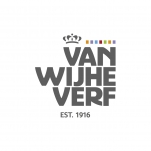

Royal Van Wijhe Verf B.V.

May 2016
Chemicals & chemical products
Manufacturing
Netherlands The
Royal Van Wijhe Verf is a dutch paint producer that develops, produces and sales decorative paints and coatings for the professional painter and the consumer (DIY market). Van Wijhe Verf also develops colorants for the BtoB market and coatings for the joinery market. Although the main market is still The Netherlands the company exports its products to over 20 countries in the world. The company is a fourth generation family business and celebrated it's 100 year anniversary in 2016. Van Wijhe Verf BV started in 1916 as a wholesale company in pharmaceutical products, paints and paint raw materials. After WOII it focused completely on the development, production and sales of decorative paints. With the dutch brand Wijzonol the company gained market share with its perfect outdoor stains and lacquers. In the '90s it became the third largest paint producer in The Netherlands with it's Wijzonol brand. Nowadays it has a broad portfolio of interior and exterior paints and lacquers and is the third paint producer in The Netherlands and also the largest independent producer. Customers are the professional painters and the brand is also available for the consumer in the DIY market.
Overall B Impact Score
Governance 16.2
Governance evaluates a company's overall mission, engagement around its social/environmental impact, ethics, and transparency. This section also evaluates the ability of a company to protect their mission and formally consider stakeholders in decision making through their corporate structure (e.g. benefit corporation) or corporate governing documents.
What is this? A company with an Impact Business Model is intentionally designed to create a specific positive outcome for one of its stakeholders - such as workers, community, environment, or customers.
Workers 31.1
Workers evaluates a company’s contributions to its employees’ financial security, health & safety, wellness, career development, and engagement & satisfaction. In addition, this section recognizes business models designed to benefit workers, such as companies that are at least 40% owned by non-executive employees and those that have workforce development programs to support individuals with barriers to employment.
Community 15.5
Community evaluates a company’s engagement with and impact on the communities in which it operates, hires from, and sources from. Topics include diversity, equity & inclusion, economic impact, civic engagement, charitable giving, and supply chain management. In addition, this section recognizes business models that are designed to address specific community-oriented problems, such as poverty alleviation through fair trade sourcing or distribution via microenterprises, producer cooperative models, locally focused economic development, and formal charitable giving commitments.
Environment 23.4
Environment evaluates a company’s overall environmental management practices as well as its impact on the air, climate, water, land, and biodiversity. This includes the direct impact of a company’s operations and, when applicable its supply chain and distribution channels. This section also recognizes companies with environmentally innovative production processes and those that sell products or services that have a positive environmental impact. Some examples might include products and services that create renewable energy, reduce consumption or waste, conserve land or wildlife, provide less toxic alternatives to the market, or educate people about environmental problems.
Customers 4.1
Customers evaluates a company’s stewardship of its customers through the quality of its products and services, ethical marketing, data privacy and security, and feedback channels. In addition, this section recognizes products or services that are designed to address a particular social problem for or through its customers, such as health or educational products, arts & media products, serving underserved customers/clients, and services that improve the social impact of other businesses or organizations.